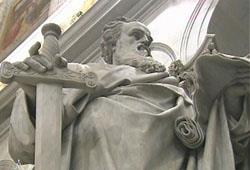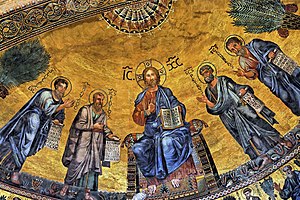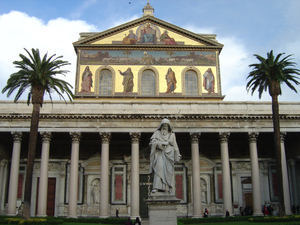Rome is a VERY fascinating place to visit due to the intersection of culture, religion, politics, and art. There is a rich sense of the human and a love of life. One important basilica is Saint Paul’s (my personal favorite). These brief videos give perspective.
Tag: St Paul outside the Walls
Christ cannot be divided, Pope urges
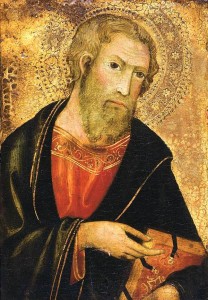 At Solemn Vespers for the Solemnity of the Conversion of Saint Paul this evening, Pope Francis preached the following homily at the Basilica of St Paul outside the Walls.
At Solemn Vespers for the Solemnity of the Conversion of Saint Paul this evening, Pope Francis preached the following homily at the Basilica of St Paul outside the Walls.
“Has Christ been divided?” (1 Cor 1:13). The urgent appeal which Saint Paul makes at the beginning of his First Letter to the Corinthians, and which has been proclaimed at this evening’s liturgy, was chosen by a group of our fellow Christians in Canada as the theme for our meditation during this year’s Week of Prayer.
The Apostle was grieved to learn that the Christians of Corinth had split into different factions. Some claimed: “I belong to Paul”; while others claimed: “I belong to Apollos” or “I belong to Cephas”, and others yet claimed: “I belong to Christ” (cf. v. 12). Paul could not even praise those who claimed to belong to Christ, since they were using the name of the one Savior to set themselves apart from their other brothers and sisters within the community. In other words, the particular experience of each individual, or an attachment to certain significant persons in the community, had become a yardstick for judging the faith of others.
Amid this divisiveness, Paul appeals to the Christians of Corinth “by the name of our Lord Jesus Christ” to be in agreement, so that divisions will not reign among them, but rather a perfect union of mind and purpose (cf. v. 10). The communion for which the Apostle pleads, however, cannot be the fruit of human strategies. Perfect union among brothers and sisters can only come from looking to the mind and heart of Christ Jesus (cf. Phil 2:5). This evening, as we gather here in prayer, may we realize that Christ, who cannot be divided, wants to draw us to himself, to the sentiments of his heart, to his complete and confident surrender into the hands of the Father, to his radical self-emptying for love of humanity. Christ alone can be the principle, the cause and the driving force behind our unity.
As we find ourselves in his presence, we realize all the more that we may not regard divisions in the Church as something natural, inevitable in any form of human association. Our divisions wound Christ’s body, they impair the witness which we are called to give to him before the world. The Second Vatican Council’s Decree on Ecumenism, appealing to the text of Saint Paul which we have reflected on, significantly states: “Christ the Lord founded one Church and one Church only. However, many Christian communities present themselves to people as the true inheritance of Jesus Christ; all indeed profess to be followers of the Lord but they differ in outlook and go their different ways, as if Christ were divided”. And the Council continues: “Such division openly contradicts the will of Christ, scandalizes the world, and damages the sacred cause of preaching the Gospel to every creature” (Unitatis Redintegratio, 1).
Christ, dear friends, cannot be divided! This conviction must sustain and encourage us to persevere with humility and trust on the way to the restoration of full visible unity among all believers in Christ. Tonight I think of the work of two great Popes: Blessed John XXIII and Blessed John Paul II. In the course of their own lives, both came to realize the urgency of the cause of unity and, once elected to the See of Peter, they guided the entire Catholic flock decisively on the paths of ecumenism. Pope John blazed new trails which earlier would have been almost unthinkable. Pope John Paul held up ecumenical dialogue as an ordinary and indispensable aspect of the life of each Particular Church. With them, I think too of Pope Paul VI, another great promoter of dialogue; in these very days we are commemorating the fiftieth anniversary of his historic embrace with the Patriarch Athenagoras of Constantinople.
The work of these, my predecessors, enabled ecumenical dialogue to become an essential dimension of the ministry of the Bishop of Rome, so that today the Petrine ministry cannot be fully understood without this openness to dialogue with all believers in Christ. We can say also that the journey of ecumenism has allowed us to come to a deeper understanding of the ministry of the Successor of Peter, and we must be confident that it will continue to do so in the future. As we look with gratitude to the progress which the Lord has enabled us to make, and without ignoring the difficulties which ecumenical dialogue is presently experiencing, let us all pray that we may put on the mind of Christ and thus progress towards the unity which he wills.
In this climate of prayer for the gift of unity, I address a cordial and fraternal greeting to His Eminence Metropolitan Gennadios, the representative of the Ecumenical Patriarch, and to His Grace David Moxon, the personal representative in Rome of the Archbishop of Canterbury, and to all the representatives of the various Churches and Ecclesial Communities gathered here this evening.
Dear brothers and sisters, let us ask the Lord Jesus, who has made us living members of his body, to keep us deeply united to him, to help us overcome our conflicts, our divisions and our self-seeking, and to be united to one another by one force, by the power of love which the Holy Spirit pours into our hearts (cf. Rom 5:5). Amen.
Francis: live an intense relationship with Jesus
The homily of Pope Francis at St Paul outside the Walls.
It is a joy for me to celebrate Mass with you in this Basilica. I greet the Archpriest, Cardinal James Harvey, and I thank him for the words that he has addressed to me. Along with him, I greet and thank the various institutions that form part of this Basilica, and all of you. We are at the tomb of Saint Paul, a great yet humble Apostle of the Lord, who proclaimed him by word, bore witness to him by martyrdom and worshipped him with all his heart. These are the three key ideas on which I would like to reflect in the light of the word of God that we have heard: proclamation, witness, worship.
In the First Reading, what strikes us is the strength of Peter and the other Apostles. In response to the order to be silent, no longer to teach in the name of Jesus, no longer to proclaim his message, they respond clearly: “We must obey God, rather than men”. And they remain undeterred even when flogged, ill-treated and imprisoned. Peter and the Apostles proclaim courageously, fearlessly, what they have received: the Gospel of Jesus. And we? Are we capable of bringing the word of God into the environment in which we live? Do we know how to speak of Christ, of what he represents for us, in our families, among the people who form part of our daily lives? Faith is born from listening, and is strengthened by proclamation.
Continue reading Francis: live an intense relationship with Jesus
Francis outside the Walls: called to proclaim, witness, worship God
At the Mass offered by Pope Francis at the Basilica of St Paul outside the Walls today reminded us that “we must obey God”! Francis asked, do we know how to speak of Christ today?
Benedictines and Jesuits converge
Last Sunday, Pope Francis, as the bishop of Rome, took possession of his cathedral church, Saint John Lateran. This coming Sunday, 14 April, Pope Francis will take possession of the Papal Basilica of Saint Paul’s outside the Walls in Rome.
A concelebrated Mass will be offered by the Pope, the archpriest, James Cardinal Harvey and the Benedictine monks to whom the pastoral care of the Basilica and the adjoining Monastery are entrusted. The monks are led by Abbot Edmund Power, OSB. He gives an interview to Vatican Radio (be aware, some of the abbot’s facts are wrong).
There is a historical connection between the Benedictines and the Jesuits. True the Benedictines about 1000 years old than the Jesuits but the historical part goes a bit deeper. The Pilgrim, as he was known, went to the Benedictine abbey of Our Lady of Montserrat in Spain, to make a general confession, keep an all-night in vigil before Our Lady’s altar, and to observe the rites of chivalry in preparation for his new life of being a converted sinner. There Ignatius left his sword and knife at the altar of the Black Madonna, he disposed of his fine clothes to a poor man, and adopted rough clothes with sandals and a staff of a pilgrim.
Work for sake of the Gospel
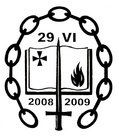 This is the summary of the Pope Benedict’s catechesis on Saint Paul for Wednesday, 27 August 2008. Here is the full text of the catechesis as published on Zenit.
This is the summary of the Pope Benedict’s catechesis on Saint Paul for Wednesday, 27 August 2008. Here is the full text of the catechesis as published on Zenit.
Online resources for the Year of Saint Paul can be found at the Vatican website, the Basilica of Saint Paul Outside the Walls, the U.S. Bishops Committee on Divine Worship and from Our Sunday Visitor.
Pope said:
Today’s catechesis presents the life of Saint Paul, the great missionary whom the Church
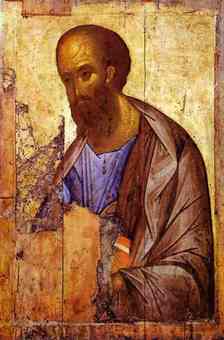 honours in a special way this year. Born a Jew in Tarsus, he received the Hebrew name “Saul” and was trained as a “tent maker” (cf. Acts 18:3). Around the age of twelve he departed for Jerusalem to begin instruction in the strict Pharisaic tradition which instilled in him a great zeal for the Mosaic Law. On the basis of this training Paul viewed the Christian movement as a threat to orthodox Judaism. He thus fiercely “persecuted the Church of God” (1 Cor 19:6; Gal 1:13; Phil 3:6) until a dramatic encounter on the road to Damascus radically changed his life. He subsequently undertook three missionary journeys, preaching Christ in Anatolia, Syria, Cilicia, Macedonia, Achaia, and throughout the Mediterranean. After his arrest and imprisonment in Jerusalem, Paul exercised his right as a Roman citizen to appeal his case to the Emperor. Though Luke makes no reference to Nero’s decision, he tells us that Paul spent two years under house arrest in Rome (cf. Acts 28:30), after which–according to tradition–he suffered a martyr’s death. Paul spared no energy and endured many trials in his “anxiety for all the churches” (2 Cor 11:28). Indeed, he wrote: “I do everything for the sake of the Gospel” (1 Cor 9:23). May we strive to emulate him by doing the same.
honours in a special way this year. Born a Jew in Tarsus, he received the Hebrew name “Saul” and was trained as a “tent maker” (cf. Acts 18:3). Around the age of twelve he departed for Jerusalem to begin instruction in the strict Pharisaic tradition which instilled in him a great zeal for the Mosaic Law. On the basis of this training Paul viewed the Christian movement as a threat to orthodox Judaism. He thus fiercely “persecuted the Church of God” (1 Cor 19:6; Gal 1:13; Phil 3:6) until a dramatic encounter on the road to Damascus radically changed his life. He subsequently undertook three missionary journeys, preaching Christ in Anatolia, Syria, Cilicia, Macedonia, Achaia, and throughout the Mediterranean. After his arrest and imprisonment in Jerusalem, Paul exercised his right as a Roman citizen to appeal his case to the Emperor. Though Luke makes no reference to Nero’s decision, he tells us that Paul spent two years under house arrest in Rome (cf. Acts 28:30), after which–according to tradition–he suffered a martyr’s death. Paul spared no energy and endured many trials in his “anxiety for all the churches” (2 Cor 11:28). Indeed, he wrote: “I do everything for the sake of the Gospel” (1 Cor 9:23). May we strive to emulate him by doing the same.
